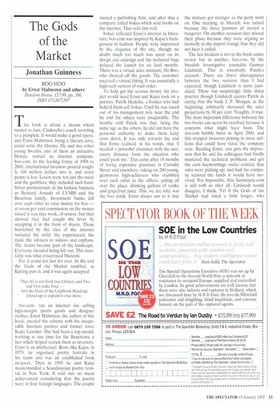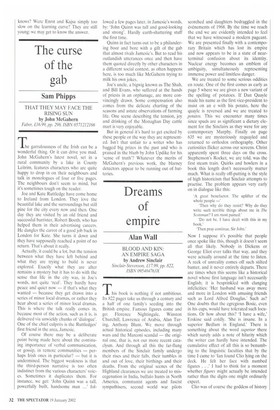The Gods of the Market
Jonathan Guinness
BOO HOO by Ernst Matmsten and others Random House, £17.99, pp. 396, ISBN 0712672397 This book is about a dream which turned to dust, Cinderella's coach reverting to a pumpkin. It would make a good opera. and Ernst Malmsten, being a literary cove, could write the libretto. He and two other young Swedes, one of them an attractive blonde, started an internet company, boo.com. In the feeding frenzy of 1998 to 2000, international investors poured roughly 100 million dollars into it, and every penny is lost. Losers were not just the naïve and the gamblers; they included such hardbitten professionals in the fashion business as Bernard Arnault of LVMH and the Benetton family. Investment banks fell over each other to raise money for boo — at seven per cent commission on the money raised it was nice work, of course, but they showed they had caught the fever by accepting it in the form of shares. Those bewitched by the idea of the Internet included the solid, the experienced, the staid, the advisers to widows and orphans. The mania became part of the landscape. Everyone dreaded being left out. This mentality was what eviscerated Marconi.
For it could not last for ever. In the end the Gods of the Market tumbled, as Kipling puts it, and it was again accepted
That All is not Gold that Glitters, and Two and Two make Four — And the Gods of the Copybook Headings limped up to explain it once more,
boo.com. ran an internet site selling high-margin sports goods and designer clothes. Ernst Malmsten, the author of this book. created the scheme with his inseparable business partner and former lover Kajsa Leander, She had been a top model, working at one time for the Benettons, a fact which helped recruit them as investors. Ernst is an intellectual. Born, like Kajsa, in 1970, he organised poetry festivals in his teens and was an established book reviewer, Then in 1993 he and Kajsa masterminded a Scandinavian poetry festival in New York. It sold out: no mean achievement considering that the poems were in four foreign languages. The couple
started a publishing firm, and after that a company called bokus which sold books on the internet. They sold this well.
bokus reflected Ernst's interest in literature; boo.com was inspired by Kajsa's background in fashion. People were impressed by the elegance of the site, though no doubt much too much was spent on its design and redesign and the technical bugs delayed the launch for six fatal months. There was a virtual sales assistant, Ms Boo, who showed off the goods. The customer received a virtual fitting. It was essentially a high-tech version of mail order.
To help get the serious money the project would need Ernst and Kajsa took on a partner, Patrik Hedelin, a banker who had helped them sell bokus. Until he was eased out of his management role near the end he and the others were inseparable. The trouble with Patrik was that, being the same age as the others, he did not have the personal authority to make them keep costs down. It was only towards the end that Ernst realised, in his words, that 'I needed a powerful chairman with the necessary distance from the situation who could push me.' This came after 18 months of hiring expensive premises in Carnaby Street and elsewhere, taking on 200 young, glamorous high-achievers who stumbled over each other in the offices, jetting all over the place, drinking gallons of vodka and grapefruit juice. This, we are told, was the boo drink. Ernst always saw to it that the mixture got stronger as the party went on. One meeting, in Munich, was ruined because the three partners all nursed a hangover. On another occasion they missed their plane because they were arguing so heatedly in the airport lounge that they did not hear it called.
The last incident is not in the book under review but in another. boo.com, by the Swedish investigative journalist Gunnar Lindstedt. This is essentially Patrik's account. There are fewer discrepancies between the two versions than I had expected. though Lindstedt is more jaundiced. There was surprisingly little sharp practice though Lindstedt quotes Patrik as saying that the bank J. P. Morgan, at the beginning, arbitrarily increased the sales projections by 30 per cent. Naughty, if true. The most important difference between the two books can never be resolved because it concerns what might have been. The dot.com bubble burst in April 2000, and this stopped investors putting in more millions that could have tided the company over. Reading Ernst, one gets the impression that he and his colleagues had finally mastered the technical problems and got the cash haemorrhage under control, that sales were picking up; and had the company secured the funds it would have survived, Not impossible, this: lastminute.com is still with us after all. Lindstedt would disagree, I think. Yet if the Gods of the Market had ruled a little longer, who
knows? Were Enrst and Kajsa simply too slow on the learning curve? They are still young; we may get to know the answer.































































 Previous page
Previous page